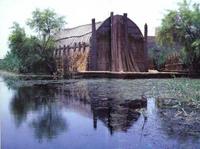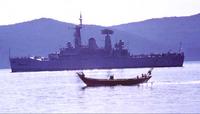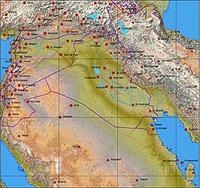Persian Gulf environment, Iraqi Marshlands and Ramsar Convention



Pollution of Persian Gulf is a very complex issue. A less discussed and researched one. In the Persian Gulf region, the Environmental Consiousness was low and there was no comprehensive enviromenal policy. The need for such policies was also not as pressing as in Europe. Environmental problems were not present in people's every day life, as it was the case in many industrial countries. Particularly the pollution of sea waters, which was happening far from their city, home and their daily life.
International organizations though, on occasions expressed their concerns about Persian Gulf pollution and even called it "The Most Polluted Body of Water". But the international community didn't pay much attention to it. The media didn't care about it. The companies in oil industry involved in this region, which come from all over the world, were of course, not interested in this particular issue. It could cost them hugely. In fact they were interested in covering up any environmental failure or disaster.
 High Traffic of vessels for oil transport, made Persian Gulf the Most Polluted Body of Water.
High Traffic of vessels for oil transport, made Persian Gulf the Most Polluted Body of Water.
Iraqi Marshlands and Ramsar
What has Ramsar to do with Iraqi Wetlands: one on Caspian sea, and the other at the tail of Persian Gulf?
Well, in fact it does. In 1971, because of high number of wetlands in Iran, an International Convention on Wetlands was held in this country…. And now, the Iraqi Marshlands in neighboring country, are being helped by people who started caring about wetlands over three decades ago in Ramsar.
A convention of some 35 years ago in Iran, on Caspian Sea, in the city of Ramsar, was held on Wetlands worldwide. This connection of wetland history to Iran, and the today’s Iraqi Marshland Crisis, might be the best occasion to know more about Iraqi Marshland, its relation to Persian Gulf Pollution and wetlands in general.
 Iraqi marshlands are located in the heart of waters flowing to Persian Gulf. The waters of vast basin of Mesopotamia (see the map), is carried by rivers of Tigris and Euphrates to Persian Gulf. Therefore, whatever pollution in this vast basin, mainly in Iraq, will add to the Persian Gulf pollution. But before reaching persian Gulf, it will affect the life of marshlands, its people and natural resources. The pollution carried by Tigris and Euphrates can involve also Turkey and Syria which don't have any direct connection or access to Persian Gulf.
Iraqi marshlands are located in the heart of waters flowing to Persian Gulf. The waters of vast basin of Mesopotamia (see the map), is carried by rivers of Tigris and Euphrates to Persian Gulf. Therefore, whatever pollution in this vast basin, mainly in Iraq, will add to the Persian Gulf pollution. But before reaching persian Gulf, it will affect the life of marshlands, its people and natural resources. The pollution carried by Tigris and Euphrates can involve also Turkey and Syria which don't have any direct connection or access to Persian Gulf.
Will Continue.


p a r t . o n e: I n t r o d u c t i o n
S i a m a k . D. A h i
P e r s i a n . G u l f . E n v i r o n m e n t
I r a q i . M a r s h l a n d s
The Convention on Wetlands, signed in Ramsar, Iran, in 1971, is an intergovernmental treaty for national action and international cooperation for the conservation of wetlands.

Pollution of Persian Gulf is a very complex issue. A less discussed and researched one. In the Persian Gulf region, the Environmental Consiousness was low and there was no comprehensive enviromenal policy. The need for such policies was also not as pressing as in Europe. Environmental problems were not present in people's every day life, as it was the case in many industrial countries. Particularly the pollution of sea waters, which was happening far from their city, home and their daily life.
International organizations though, on occasions expressed their concerns about Persian Gulf pollution and even called it "The Most Polluted Body of Water". But the international community didn't pay much attention to it. The media didn't care about it. The companies in oil industry involved in this region, which come from all over the world, were of course, not interested in this particular issue. It could cost them hugely. In fact they were interested in covering up any environmental failure or disaster.
 High Traffic of vessels for oil transport, made Persian Gulf the Most Polluted Body of Water.
High Traffic of vessels for oil transport, made Persian Gulf the Most Polluted Body of Water.Persian Gulf Wars, created black clouds, black rains and spread Radioactive Dust all over Persian Gulf Region...! These Gifts of Civilized World to Persian Gulf to be studied on one hand, and on the other hand, the water and lif in and around Persian Gulf, independent from oil or war, to be studied and monitored in much greater sense.
 The basin is what we should know all about. We should know about all the rivers that run to Persian Gulf, About the ports and cities that dump their waste in it,… about birds, fishes,… and all form of wild life in and around it. A search that never ends, … as long as Persian Gulf exist.
The basin is what we should know all about. We should know about all the rivers that run to Persian Gulf, About the ports and cities that dump their waste in it,… about birds, fishes,… and all form of wild life in and around it. A search that never ends, … as long as Persian Gulf exist.
 The basin is what we should know all about. We should know about all the rivers that run to Persian Gulf, About the ports and cities that dump their waste in it,… about birds, fishes,… and all form of wild life in and around it. A search that never ends, … as long as Persian Gulf exist.
The basin is what we should know all about. We should know about all the rivers that run to Persian Gulf, About the ports and cities that dump their waste in it,… about birds, fishes,… and all form of wild life in and around it. A search that never ends, … as long as Persian Gulf exist. Here, on this page, we will see more and more on this issue, and we will become familiar with organizations, people, laws and regulations, conventions and treaties, news, documents, projects, employments … and whatever can have any influence on the destiny of Persian Gulf Life. Iraqi Marshlands are one of them.
Iraqi Marshlands and Ramsar
What has Ramsar to do with Iraqi Wetlands: one on Caspian sea, and the other at the tail of Persian Gulf?
Well, in fact it does. In 1971, because of high number of wetlands in Iran, an International Convention on Wetlands was held in this country…. And now, the Iraqi Marshlands in neighboring country, are being helped by people who started caring about wetlands over three decades ago in Ramsar.
 Iraqi marshlands are located in the heart of waters flowing to Persian Gulf. The waters of vast basin of Mesopotamia (see the map), is carried by rivers of Tigris and Euphrates to Persian Gulf. Therefore, whatever pollution in this vast basin, mainly in Iraq, will add to the Persian Gulf pollution. But before reaching persian Gulf, it will affect the life of marshlands, its people and natural resources. The pollution carried by Tigris and Euphrates can involve also Turkey and Syria which don't have any direct connection or access to Persian Gulf.
Iraqi marshlands are located in the heart of waters flowing to Persian Gulf. The waters of vast basin of Mesopotamia (see the map), is carried by rivers of Tigris and Euphrates to Persian Gulf. Therefore, whatever pollution in this vast basin, mainly in Iraq, will add to the Persian Gulf pollution. But before reaching persian Gulf, it will affect the life of marshlands, its people and natural resources. The pollution carried by Tigris and Euphrates can involve also Turkey and Syria which don't have any direct connection or access to Persian Gulf.Will Continue.


2 Comments:
Get 1000s of Links pointing back to Your Site... Starting Today!
to all of the major RSS feed directories on the Internet.
Post a Comment
<< Home